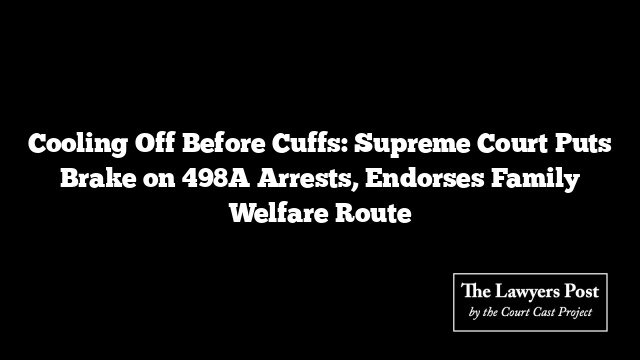In a major nod to due process and a check on knee-jerk arrests, the Supreme Court has thrown its weight behind a two-month “cooling-off” period before any arrests are made under Section 498A of the Indian Penal Code — the infamous “cruelty to wife” provision long criticized for misuse in matrimonial feuds.
Backing guidelines crafted by the Allahabad High Court in 2022, a bench led by Chief Justice BR Gavai and Justice AG Masih directed that the detailed framework laid out for Family Welfare Committees (FWCs) should be adopted across the board and enforced by relevant authorities.
The underlying message: Slow down, assess, and try dialogue before diving into detention.
The High Court’s original guidelines, inspired by the Supreme Court’s precedent in Social Action Forum for Manav Adhikar v. Union of India, aim to protect against blanket criminalization of entire families by angry spouses — a growing trend the top court has repeatedly flagged with concern.
Here’s what the Supreme Court-endorsed plan looks like:
- No Immediate Arrests: Once an FIR under Section 498A is filed, the police can’t swoop in. A mandatory two-month pause must follow before any arrest or coercive action is taken.
- Automatic Referral to FWCs: Every complaint under 498A, minus serious injury charges or those involving crimes punishable over 10 years, is to be sent straight to the Family Welfare Committee in the district.
- FWC Setup: Each district must establish one or more FWCs under the District Legal Services Authority. Each committee is to have three members, and their performance will be monitored by the District or Sessions Judge.
- Who Sits on the FWC? A mix of grassroots wisdom and legal understanding:
- Young lawyers or final-year law students with a public-spirited record.
- Retired judicial officers or respected social workers.
- Even educated spouses of senior judicial or administrative officers may be roped in.
- No Witness Role: FWC members are there to mediate, not to testify. Their function ends at the report stage.
- Bring the Elders: Complainants and respondents must each appear before the committee with up to four elderly family members. The idea: make it a serious family sit-down, not a procedural formality.
- Comprehensive Reporting: After deliberations, the committee must submit a detailed report to the Magistrate and police, capturing both facts and its opinion. This is what guides action after the cooling-off period expires.
- Police to Stand Down: Until the committee process wraps, the cops are expected to hold back on intervention — a move to encourage resolution over retribution.
With this judicial seal, the Court has effectively placed an accountability filter over one of India’s most misused legal weapons in domestic disputes. The goal isn’t to dilute the rights of aggrieved women — it’s to prevent legal processes from becoming tools of vengeance rather than justice.
The cooling-off period isn’t just procedural — it’s philosophical: cool heads before cold cells.





